|
Posted by Romy the Cat on
06-20-2007
|
|
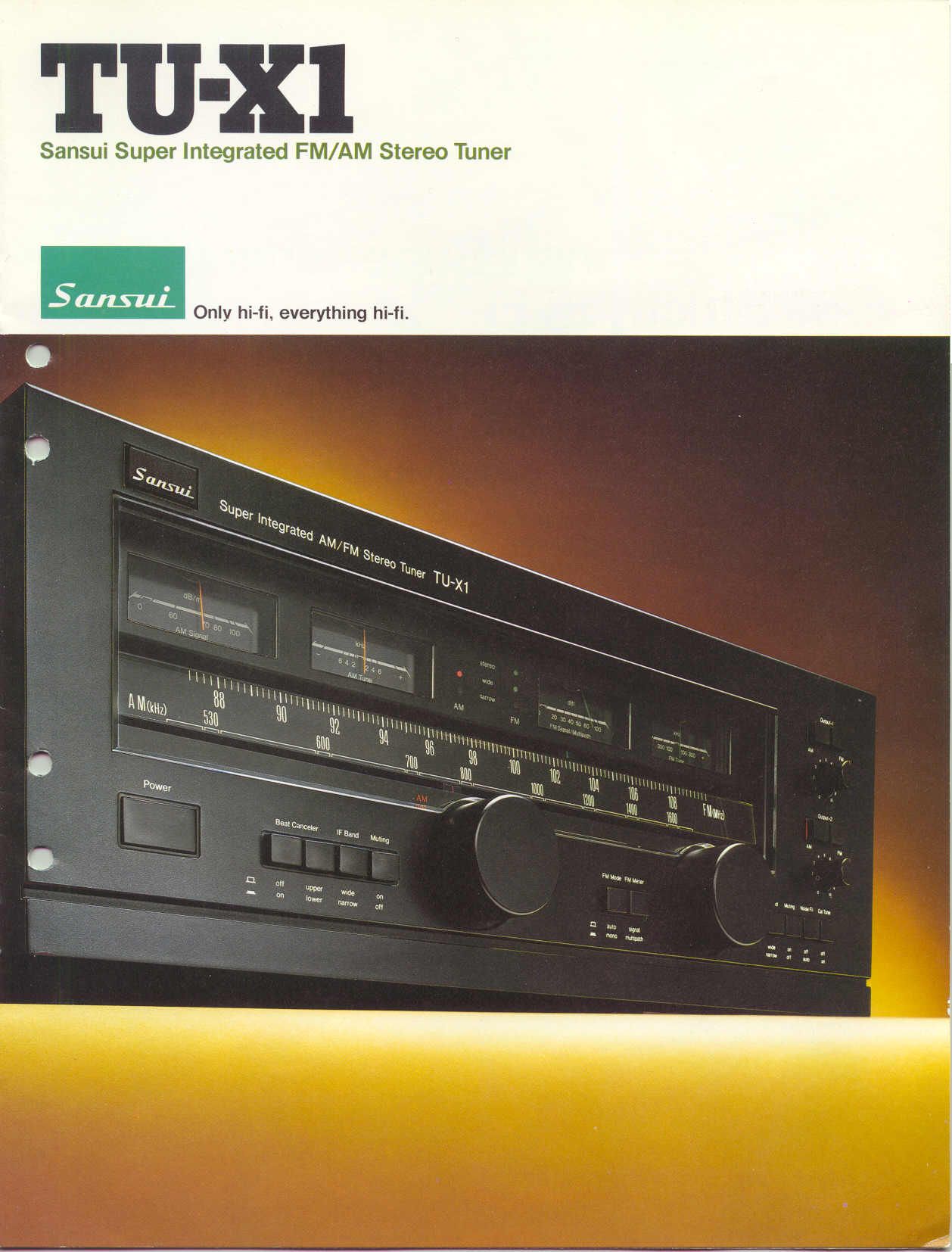
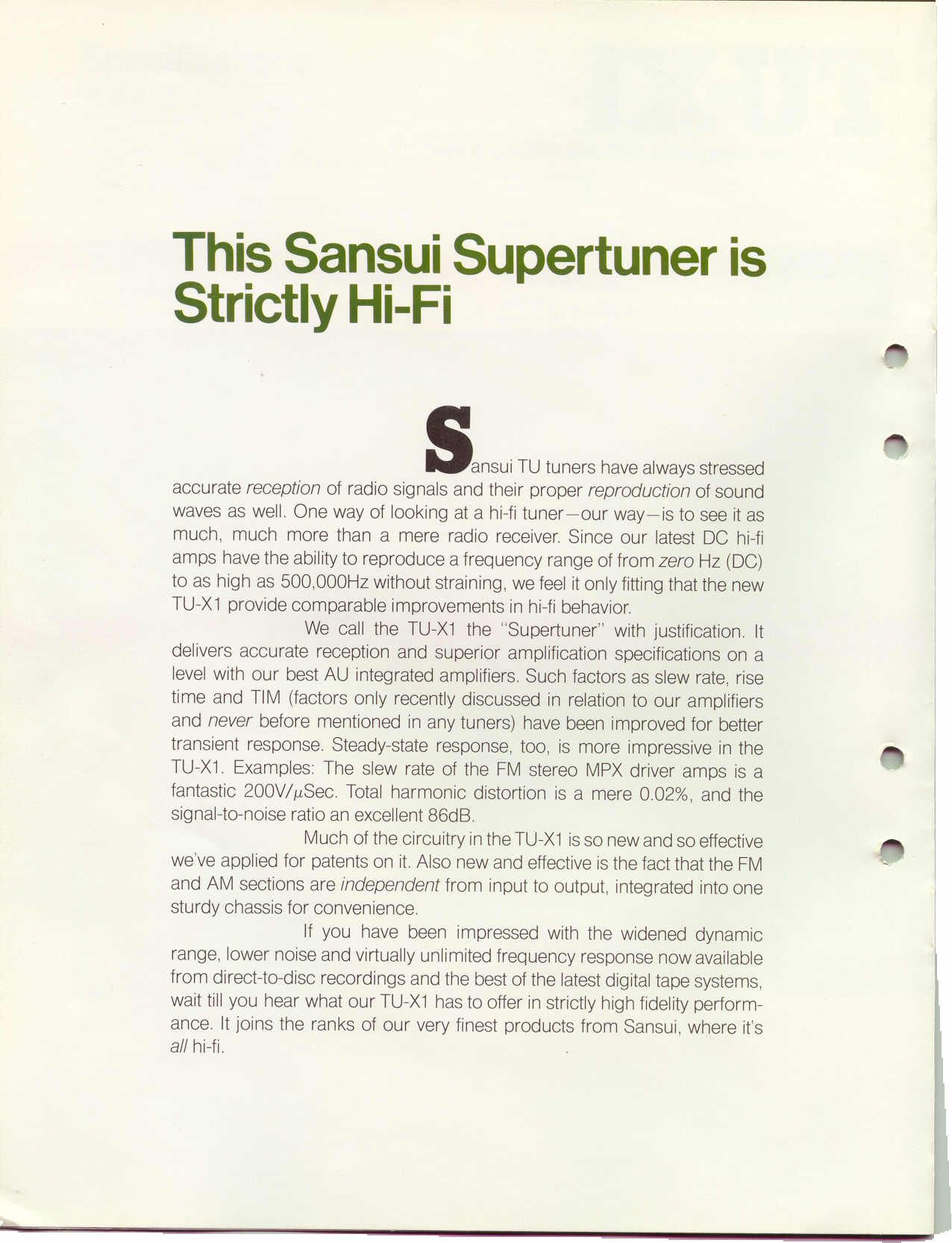

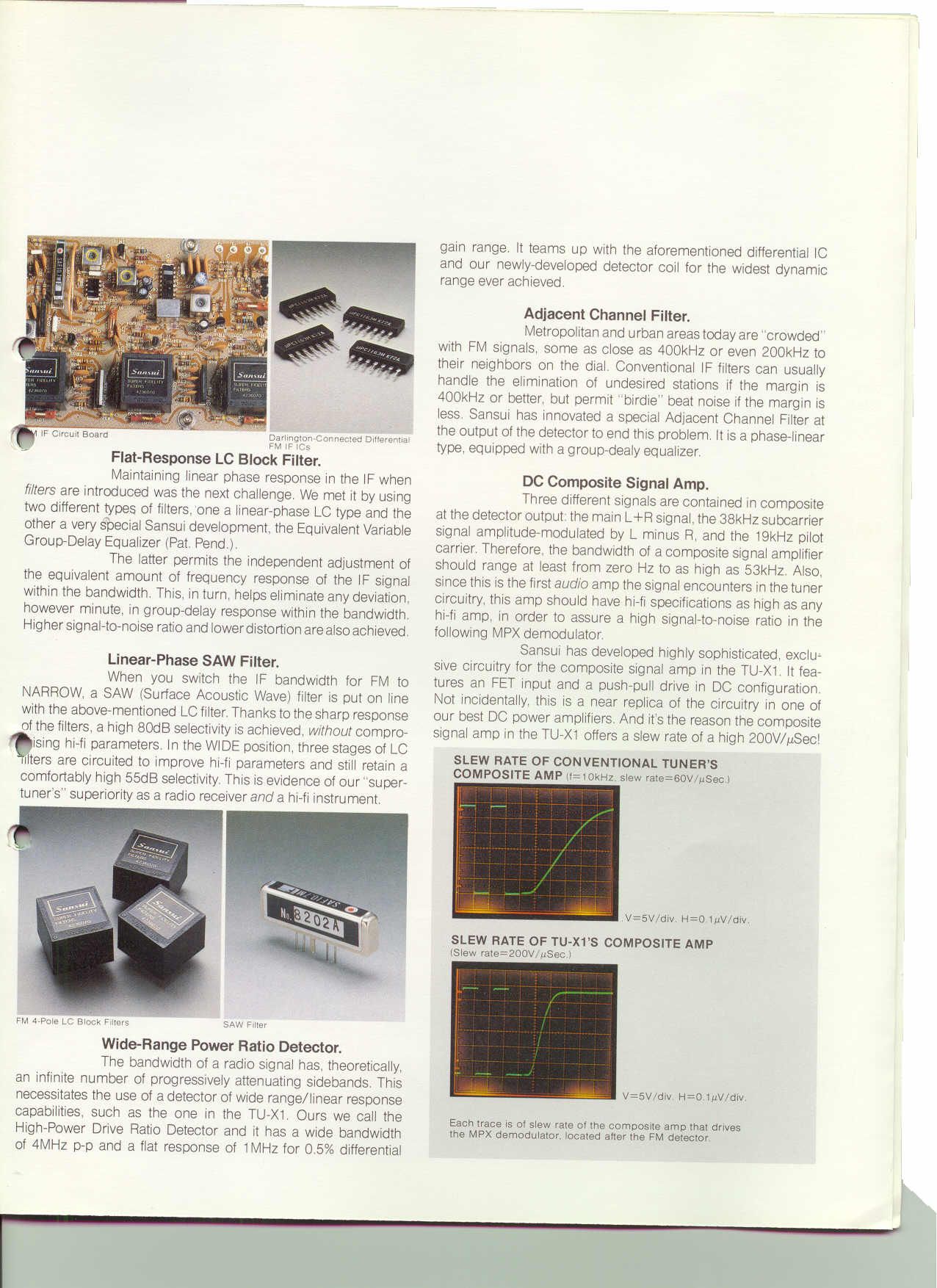
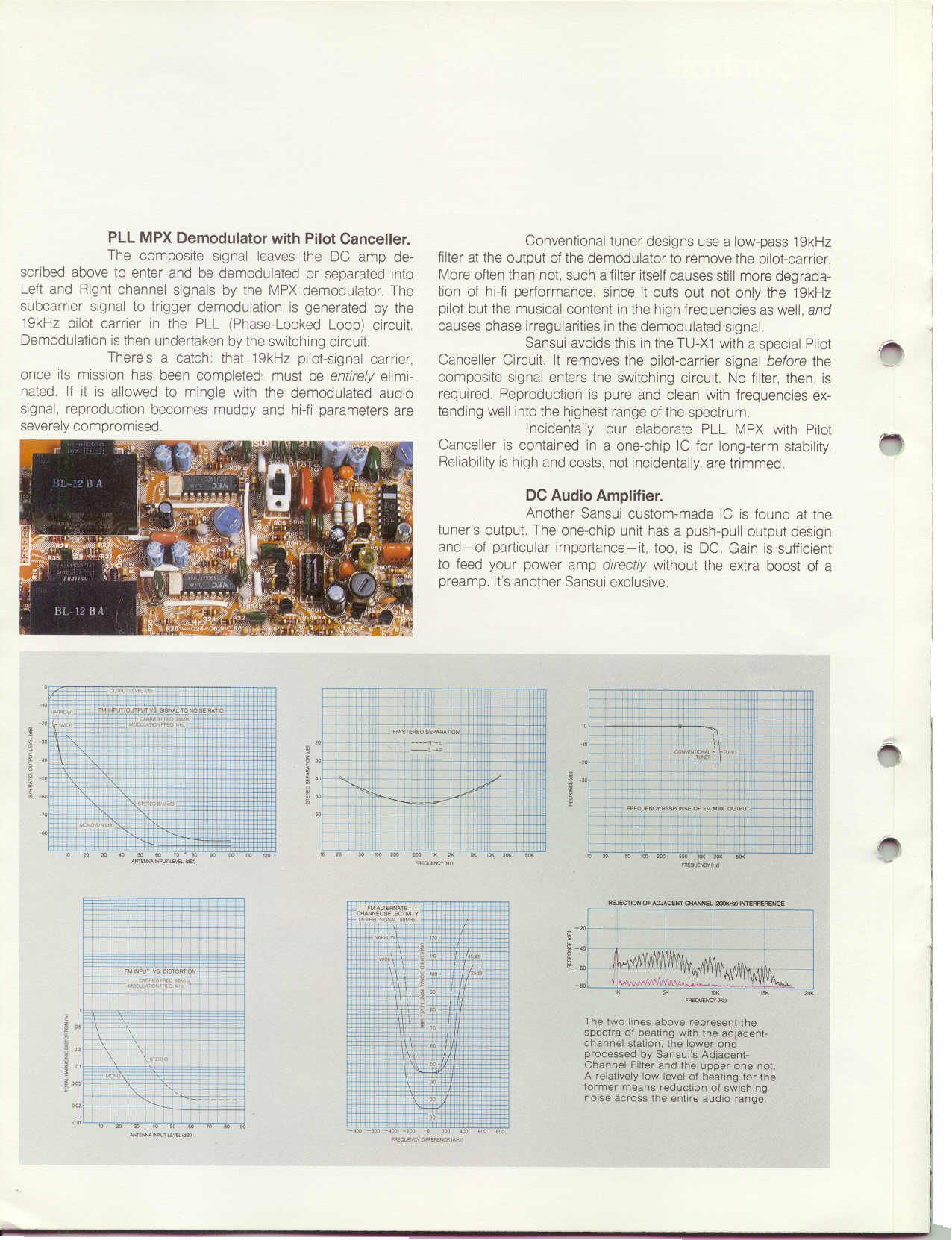
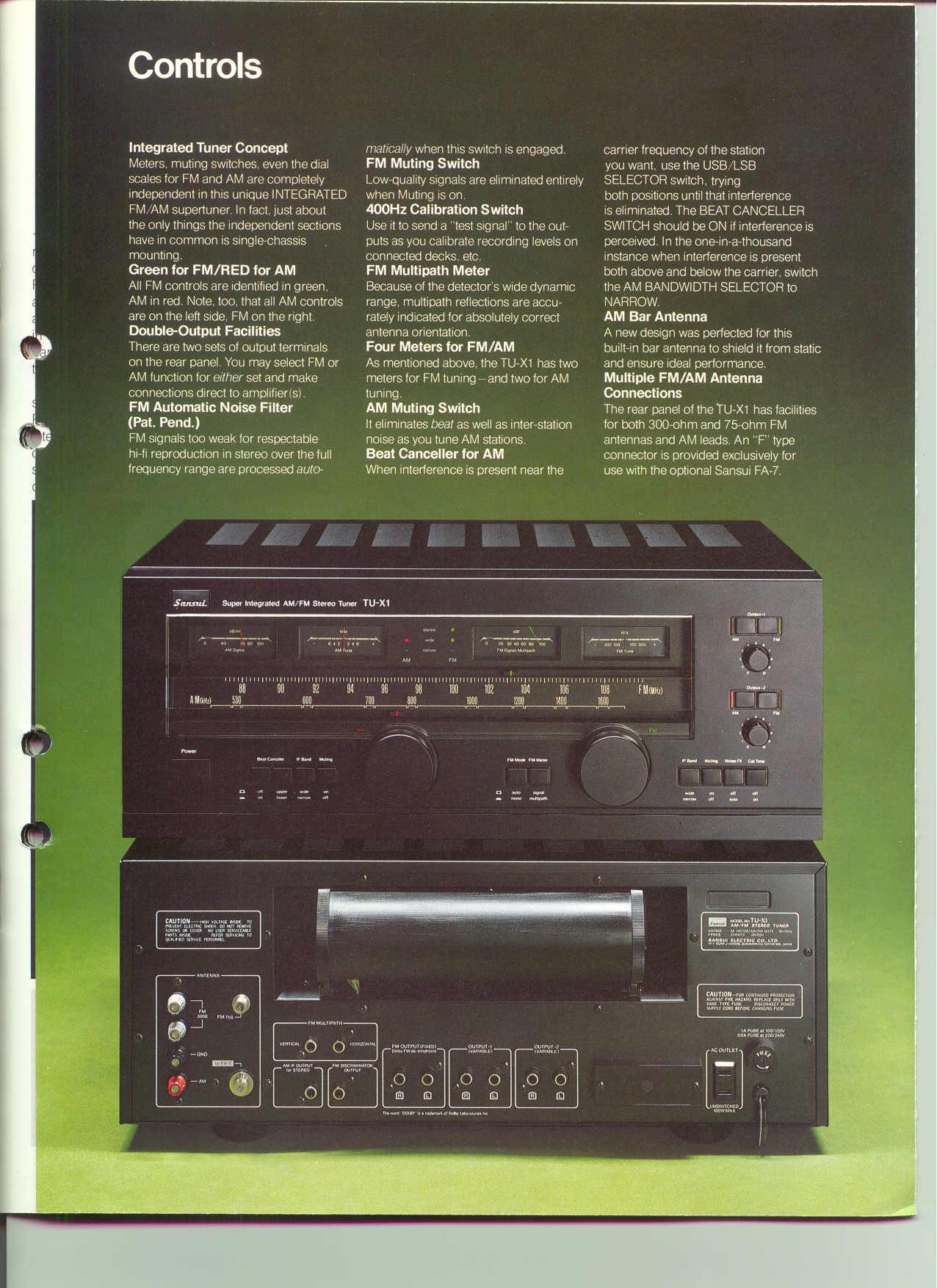
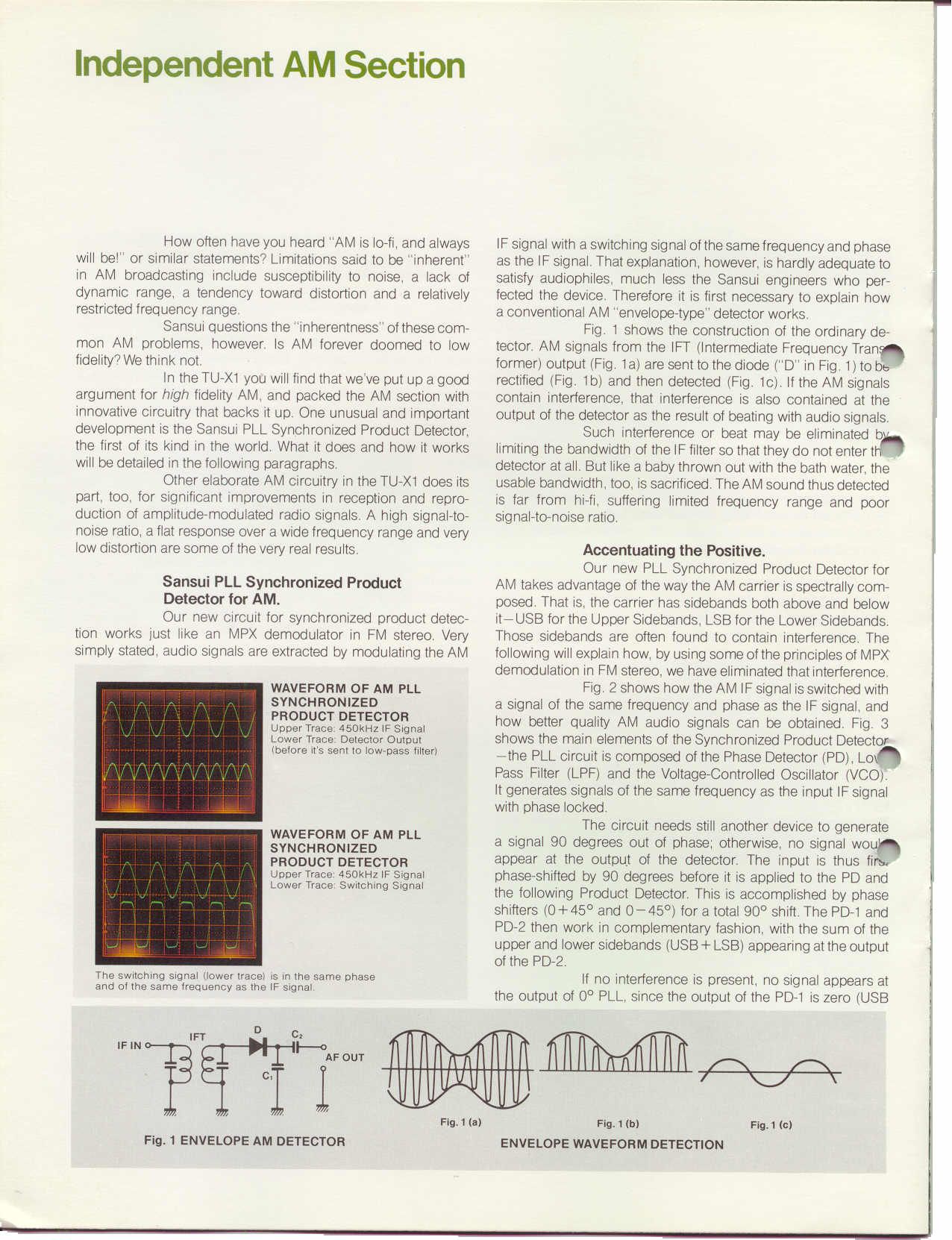
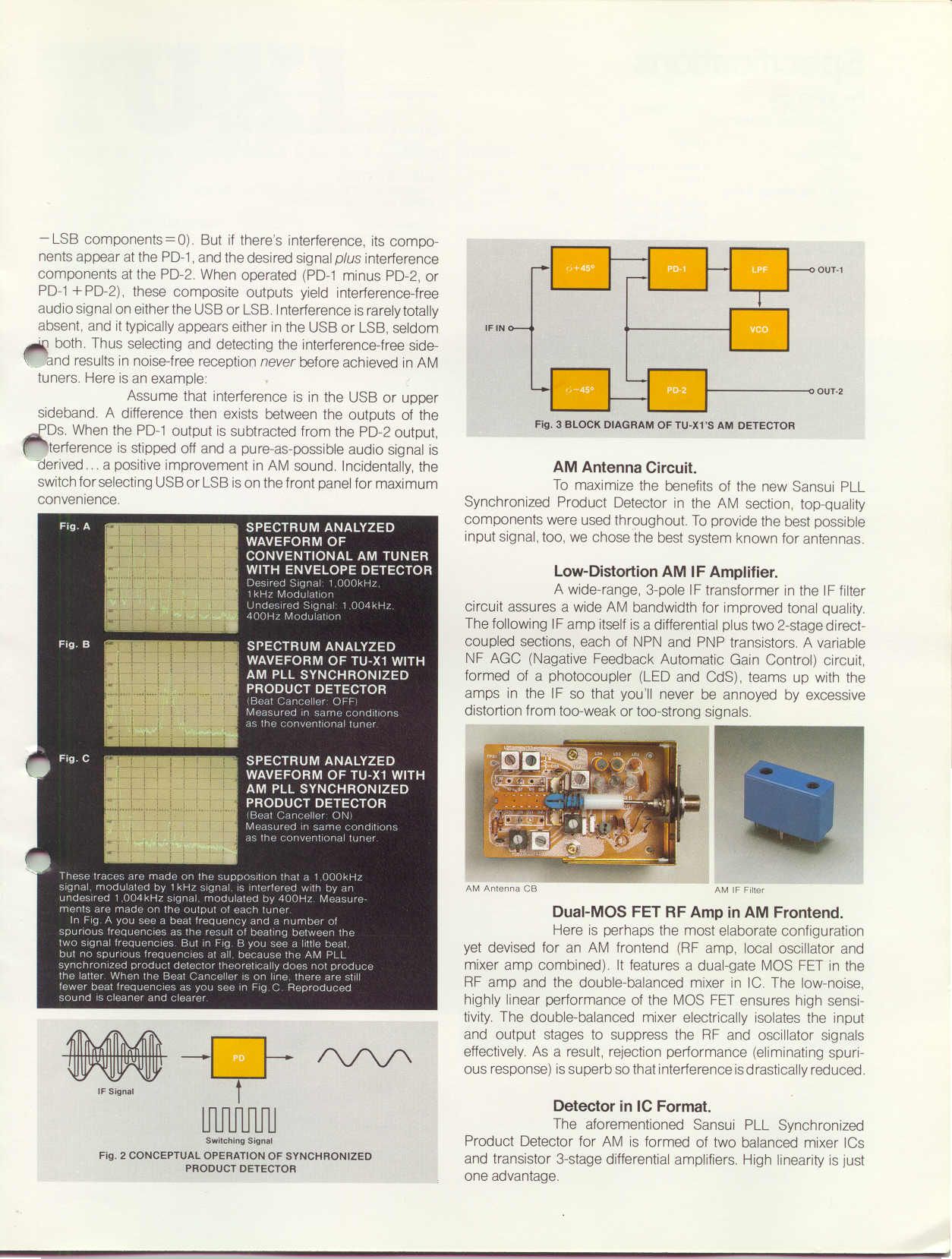
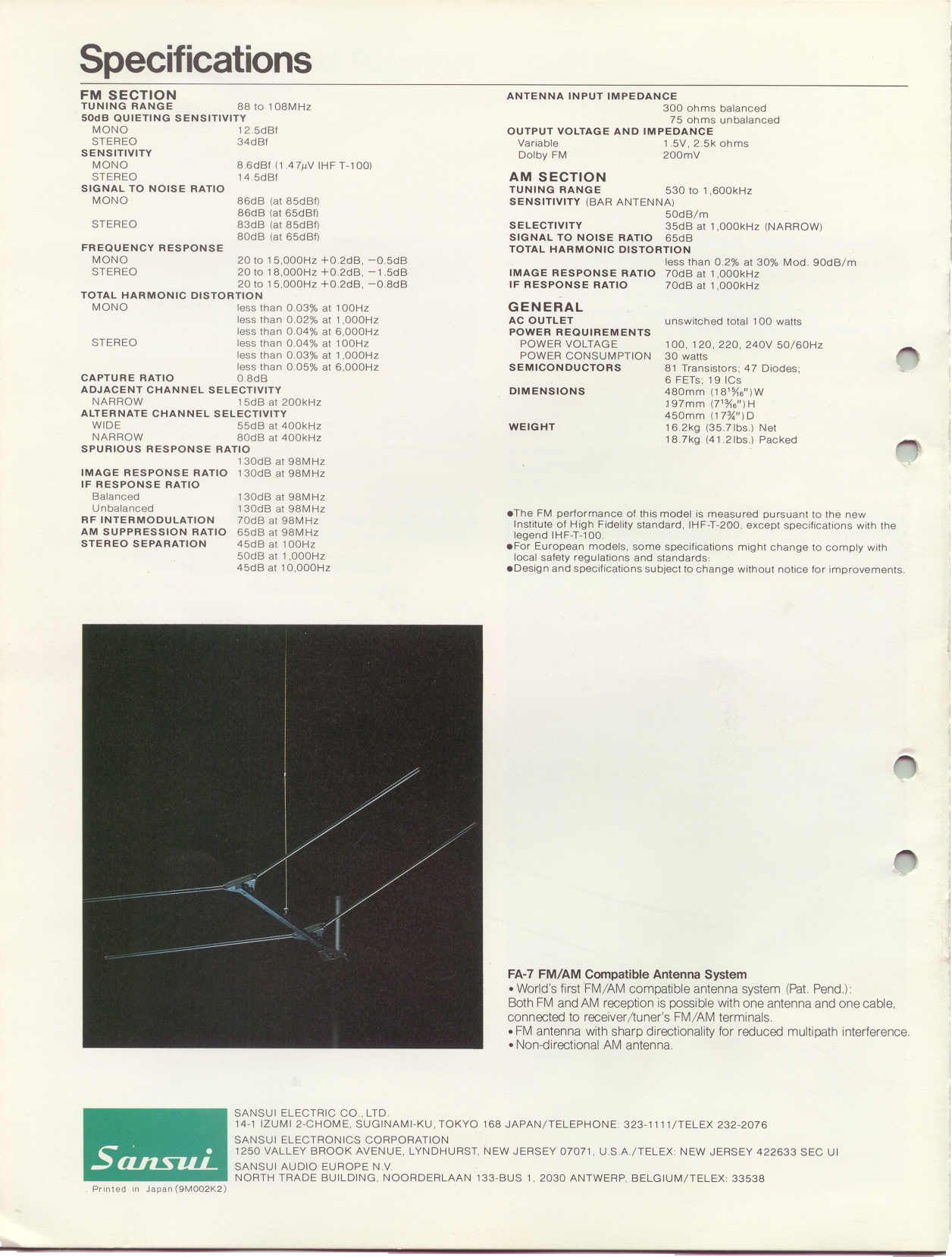
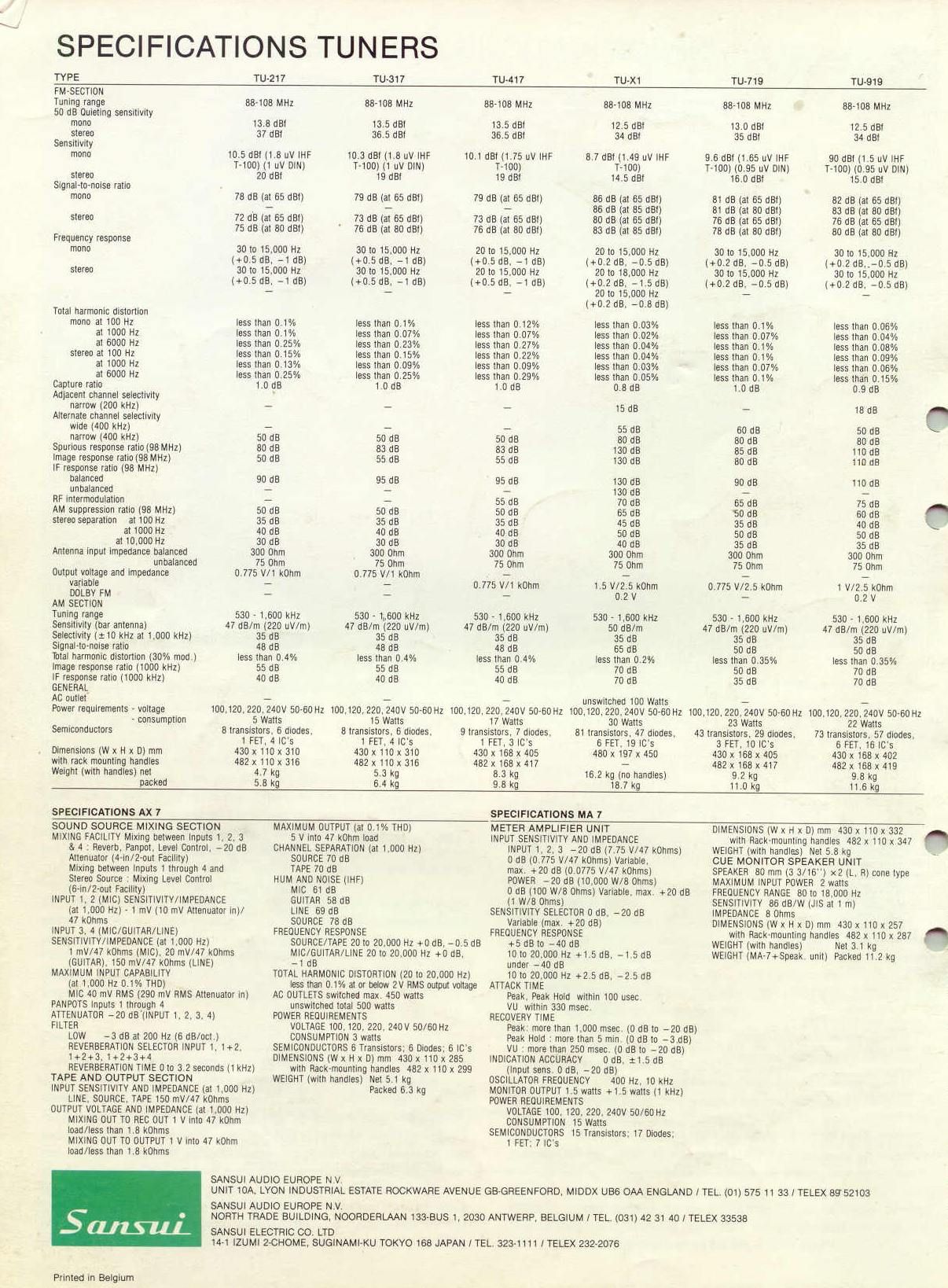
|
|
|
|
|
|
|
Posted by Romy the Cat on
12-19-2007
|
|
I spoke with various people about availability of upgrades for Sansui TU-X1. I have to admit that I have no problems with it sound and my concern is purely intellectual – there are better sounding resistors nowadays and there are better caps then electrolytics in signal path as Sansui used in 70s. So I was wondering what would happen if juts to replace a few parts in the magnificent Sansui TU-X1.
Still, I am afraid that is it will be killed then it will be killed… and I have see a lot of it in hi-fi… and practically among the Morons who do the parts swapping….
So, I decided to make it clean… I have a second Sansui TU-X1 that I keep for 2 year in my storage – just in case (I too much value my FM experiences). So I decided to bring the second TU-X1 to the specification of my current tuner and then to change the part in signal path to the best contemporary parts. If you read the FM circuit then here is what will be changed: http://www.goodsoundclub.com/pdf/TU-X1_FM.pdf
1) R09 120K (or more) - 310K - increase gain
2) R07, R08, loading 22K
3) R17, R18 560R - 562R
4) R11, R12, R03, R04, loading 100K
5) R01, R02 3.9K (.5W) - 4.1K
6) C17+C15+C19 combined bipolar and bypassed 10u/16V
7) C16+C18+C20 combined bipolar and bypassed 10u/16V
8) C27, C28 1000pF
9) C602 10uF/25V
10) C01, C02 0.47uF The alignment, tuning and changes will be done very soon and then the sound of the both: virgin Sansui TU-X1 and the updated will be compared. I am very interested to hear the result. I outcrossesed the changes to my Doctor Sansui – Kenneth Bernacky from “Stereo Surgeons” ( http://www.stereosurgeons.com/AboutUs.html )
The Cat
|
|
|
|
Posted by glaesemann on
01-22-2008
|
|
Any post op news?
|
|
|
|
Posted by Romy the Cat on
02-17-2008
|
 Romy the Cat wrote: Romy the Cat wrote: | | The alignment, tuning and changes will be done very soon and then the sound of the both: virgin Sansui TU-X1 and the updated will be compared. I am very interested to hear the result. |
|
I got my second Experimental Sansui TU-X1 back after a year-long repair and re-calibration. This second tuner sound much more advance then my first one and I retire my first Sansui. Unfortunately the project of comparing of the same tuner with the default critical parts and the replaced is failed. The reason is because my second Sansui TU-X1 is turn out to be better tuner then my first one.
What I got the second Sansui TU-X1 I bought it “as new” in Germany and it was sitting in my storage; I did not even open it up what I got it. When I sent it to Connecticut “Stereo Surgeons”, the owner, Ken Bernacky informed me that the tuner is cooked by lighting and absolutely not operational. He rebut the front end of the tuner and then did all necessary further repair and aliments. As the result he suggested that this second tuner should be better (in term of operation, he does not care about the replaced parts) then my first one. Well he tune out to be correct – my “new” Sansui TU-X1 has much better performance. However, this improved performance is not related to the changed coupling caps or better feedback resistors. The new tuner has less noise; better selectively – the characteristic that has no relation to the parts change in output stage.
The first tuner was released by Ken to me with:
Sensitively: 0.8uv
Distortions Wide Stereo: 0.022%
Distortions Wide Mono: 0.015%
Separation: 56dB
This second tuner has the following numbers:
Sensitively: 0.8uv
Distortions Wide Stereo: 0.029%
Distortions Wide Mono: 0.016%
Separation: 58dB
So, the numbers are closed but for whatever reason I have a stronger signal with common stations. As you understand the change of coupling capacitor in output stage from 30 year old polarized electrolytes to the contemporary non- polarized Nichicon Muse has no impact to sensitively of tune or to its noise. So, I got better tuner but lost the experiment. The caT
|
|
|
|
Posted by Romy the Cat on
02-18-2008
|
|
It is come to me that something is not right with sound that I get from the New Experimental Sansui TU-X1. The “new” TU-X1 better tunes to stations and have better noise butt it has slightly less interesting tone then my old Sansui. You know that string tone that smells with the aroma of autumn leaves… the “new” Sansui does not have it. It doe use the best parts for replacement of the critical element of the output stages…. but it has no tone that I would like it to have. Perhaps I need more time to burn the pasts in but at point I am surprised and disappointed in a way. The parts that I put in the game are much better then what use to be… The caT
|
|
|
|
Posted by Antonio J. on
02-19-2008
|
Those are very bad and concerning news. In my very flawed and very low resolving system I can feel the tone you're speaking of, which no other of my sources has. Does it keep the "space thing" the original has? I wish it gets back when those new parts are burn-in, hopefully it's just a too new parts syndrom.
Rgrds.
|
|
|
|
Posted by Romy the Cat on
02-19-2008
|
From another perspective it has film capacitors and the non-polarized Nichicon Muse caps. They take up-to to 30 days to burn-in. So, it might be just too fresh. I would not say that it kills everything – it is just a very-very slightly brighter, enough to mask out the “other things”. It is, to a degree, like the “sound” of Vienna Philharmonic compare to the sound of London Symphony. Well, let see where I will stay in a month – I always can put the old Sansui back, declaring the project as a dead end. Meanwhile I recorded yesterday the Bruckner 5 with the best last movement I ever heard (Thanks to Clark for his tip – I would miss it). I actually used the New Sansui. I probably, when the new unit will settle down, need to recorder both of them at the same time and to see what different it would be…
 Antonio J. wrote: Antonio J. wrote: | | … In my very flawed and very low resolving system I can feel the tone you're speaking of, which no other of my sources has. |
|
Wait unit you flourish that tone with a good Injection Channel – there is nothing else like this know to me in audio compare to a sound of life broadcast from a good station sponsored by that TU-X1’s tone and space.
The caT
|
|
|
|
Posted by Romy the Cat on
02-23-2008
|
There are two fragments of recordings: 3 weeks ago and today. The Wagner file was made from original Sansui and the Bizet’s file with that new Sansui with updated better parts. I think it is possible to see what I meant to say. Please do not download the files if you can’t play 88/24k. The files are 71 and 47 meg…
<< File # 1 was here. >>
<< File # 2 was here. >>
The Cat
|
|
|
|
Posted by Antonio J. on
02-24-2008
|
Which are huge, they not even sound as the same orchestra into the same venue. I don't know if my computer rig, which I must use to play the 24/88 files, using a pair of SL600 into a very small room, would qualify themselves as a whole injection channel and are increasing that tone issue, but it's quite noticeable.
The Carmen sounds with some hollowness in the midrange, mabye around 500-700 Hz that makes for thinner violins and makes the lower register strings kind of "missing in action". OTOH the Wallkure has the same color, tone or whatever I'm having in the other system where the TU-X1 sits. Can't say what's it about, but sounds simply "right". The horns also have that rightness. In this setup I can't speak about space, but I'd say that the Wallkure has it better, kind of deeper and more coherent, but not really sure.
I wish I had as a good antenna and broadcasting quality station as you... well, the room, time, wealth and knowledge to set up a really interesting system hehehe. Someday.
Hopefully the modified TU-X1 gets it closer to the standard after some more playing time. Good luck!
Rgrds
|
|
|
|
Posted by Romy the Cat on
02-24-2008
|
|
Sure the music is too different to judge sound, the fragments were more my personal impression of the differenses between the tuners. The new TU-X1 is slightly sharper in musical terms. It does not make it a bad tuner, in fact I feel it is better in term of Hi-Fi, but the “TU-X1 magic” with new tuner got slightly reduced. Also, the old original tuner more “intelligently” joins noted then new one. I do not know if it is because the parts change or because they are just two different machines – I did not listen the new tuner before it was repaired. Whatever it is I am taking result as it is and I do not think that the new tuner will change more with more burning in.
|
|
|
|
Posted by Romy the Cat on
02-25-2008
|
|
Ok, as I promised I repost the final result - a complete fiasco. I have no idea why – becose the “better” parts in output stage or because it is just a different unit but the new Sansui TU-X1, although it is objectively better then my old Sansui TU-X1, have lost it’s battle and will not be used anymore. The old stock TU-X1 returned to it's noble service.
|
|
|
|
Posted by Romy the Cat on
02-26-2008
|
|
I was playing today a little with my “reminded in service” TU-X1 and what do you know? I found a way to make it to sound even better than before. I mean really really really better. I mean better up to the point the It I hardly believable. Where I was with it before???
Just in order do not be follow in the damn-glorifications of the “new old” TU-X1 here is a short clip I recorded a few minutes ago. Sorry, it is some kind of crappy local jazz – my local FM stations do not broadcast live any more serious music just according to my demands. Still it dives some idea about the capacity of FM. BTW, the file is 44kHz 20 bit not the 88kHz as I usually do - I did it to keep the file smaller…. You still won’t be able to play it on a regular computer and you would need a dedicated audio machine...
<< File # 1 was here. >> Rgs, Romy the Cat
|
|
|
|
Posted by Antonio J. on
02-27-2008
|
|
I had some difficulties to have the file sounding. The software I use to play higher than usual bitrate PCMs (20 or 24/88) on kernel mode to bypass Windows processing won't play the file, then I had to use Jetaudio. It was the only one which worked and played it at 20/44. Perhaps this was the cause, or maybe that I didn't care for the music, but apart from a nice space illusion, I couldn't find the sound any more interesting than the "normal old" TU-X1, in fact quite less right. It sounded kind of dull and didn't like piano and sax timbres. Voice was just acceptable in this setup.
Since this result can very well be for the playback software, I'd be thankful if you could tell me what software could I try that is 20/44 capable and allows to bypass Windows sound "managing" (I'd rather say screwing up).
Rgrds.
|
|
|
|
Posted by Romy the Cat on
02-27-2008
|
|
Antonio, I disagree. I found it very good result and it is very much irrelevant how piano ir oe what kind timbres the sax has. Come on, this is some kind crappy jazz-band and in a local bar, how much you expect?
The point is that you need to know what you are listen when you are hearing. Did you play attention to HF noise in MET recording? That was from a station that has 80% of signal. The jazz recording wasat 40% of signal. However, look at the nose level at the jazz recording. It is hugely down. The TU-X1 has a circuit of noise redaction hat blending HF between right and left channel, substantially lowering HF nose. Still, if you listed the crappy jazz recording then you will see the HF information is not monophonic but have well defined separation. It means my TU-X1 has now this level of nose without noise redaction.
I do not know what player you use to play those files on your PC but I am very happy with the result. The Cat
|
|
|
|
Posted by Antonio J. on
02-27-2008
|
 Romy the Cat wrote: Romy the Cat wrote: | |
Antonio, I disagree. I found it very good result and it is very much irrelevant how piano ir oe what kind timbres the sax has. Come on, this is some kind crappy jazz-band and in a local bar, how much you expect?
The point is that you need to know what you are listen when you are hearing. Did you play attention to HF noise in MET recording? That was from a station that has 80% of signal. The jazz recording wasat 40% of signal. However, look at the nose level at the jazz recording. It is hugely down. The TU-X1 has a circuit of noise redaction hat blending HF between right and left channel, substantially lowering HF nose. Still, if you listed the crappy jazz recording then you will see the HF information is not monophonic but have well defined separation. It means my TU-X1 has now this level of nose without noise redaction.
I do not know what player you use to play those files on your PC but I am very happy with the result. The Cat |
|
Now that I know where the "better results" were placed I must agree, the noise level is astonishingly good. When I listened to the track for the first time, for a while I thought you were kidding us with a recording from a source other than FM. So finally, no trip to your storing room for the "new" TU-X1? ;-)
Rgrds.
|
|
|
|
Posted by Romy the Cat on
02-27-2008
|
|
Nope, it was not the “new” TU-X1 but the old one and it has nothing to do with modifications that I did with the old one. I just looks like found a way to make the TU-X1 to lose a lot of its noise by changing the way how antenna feeds to the front end. I will tell about it in futures what I confirm everything.
|
|
|
|
Posted by Romy the Cat on
02-27-2008
|
|
I overly impressed with the new way or routing the antenna input with my TU-X1. This tuner with this new input get amassing sensitively (much higher than original) with a nose of a good CD player – very impressive! Way more interesting as it was right after the alignment. A person with whom I spoke, who presumably knows this thing suggested me that now the tuner should be realigned with the new antenna mapping. Perhaps he is right I. My tuner technician who would do the new alignment unfortunately is not cooperative on the subject as he too closed-minded in what he already knows. Very said. I did tell him what I did with inputs and he is a complete disbelieve, He things that I lie him. I have no idea why people put ego in place where it should be just a curiosity…
Another sad fact. I was trying to get into the subject with the folks from Yahoo FM Tuners Bulletin Board. I have a quite good contacts and people where very useful. The tweak that they proposed to gain more sensitivity of TU-X1 I have tried before and the direct pass from coax to front end that my technician implement worked identical to the Yahoo folk’s suggestion. The FA7 tweak takes the result way beyond it, waaaay beyond. So what was sad? Well, put the Yahoo FM Bulletin Board in the long list of the only forums from where I was “banned”, at least they believe that they banned me not wise versa. I posted at that forum a few month back in response of a guy to “update” TU-X1 with Black Gate capacitors. I relayed to him that it would be incredibly foolish step. In response my post was deleted and I had a lengthy email form Bob Fitzgerald (one of the Bulletin Board moderators) who informed how I need to reply:
“Instead of telling people what not to buy …. please suggest brands and model numbers of caps that you like, and why.”
I can’t believe that this cretin put himself in position to obligate me what I need to do/say. I suggested him to go go screw himself. Yesterdays I made a number of comments about my new TU-X1 discovery in yahoo site. People reposed and some proposed usefuel ideas why it might be. Suddenly my posts get deleted and I got email from Bob Fitzgerald. This Moron in his power trip said:
“… when I look at anything your emails and posts, they are unreadable, and make no sense.”
Well, probably if for this specific idiot my posts "make no sense" then they deserved to be deleted? Well, I suggested him to die with his fucking secret and this time that idiot got the message – I was successfully “banned”.
Anyhow, behind all of those stupid stories there is truth – the very interning benefit of driving the TU-X1 with “inverted” FA7 input. When I dig to the bottom of this tweak I will post the details explaining how it might be done but for a time being here two images. It is the same station, the same tuner, the same frequency and same position of antenna. The differences are following: The First is driving the front end directly from coax (no balan or anything else - exactly how I got it from my shop). Second is driving the front end from my “tweak” - the “inverted” FA-7 input.
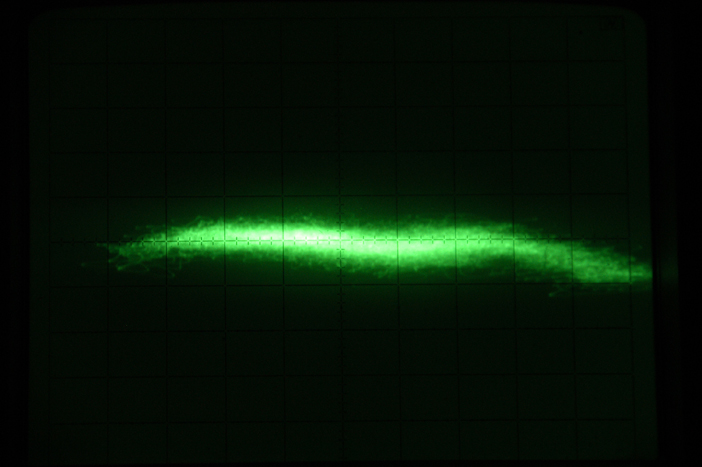
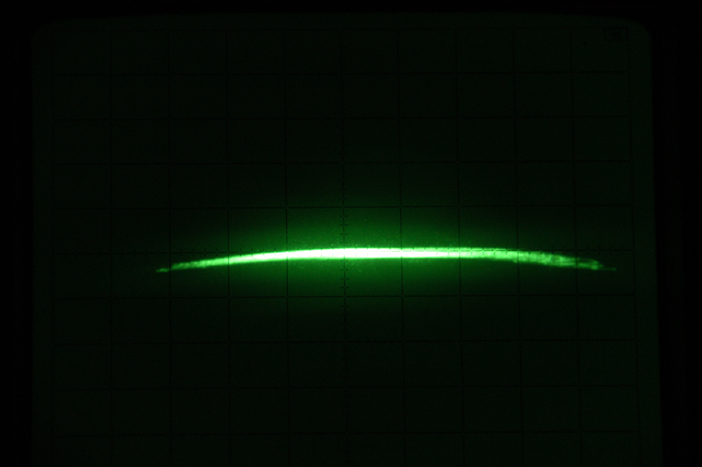
Rgs, Romy the Cat
|
|
|
|
Posted by Antonio J. on
02-28-2008
|
The second scope using your tweak is much cleaner and defined. When you believe you've got it and can share it with us, please do, I'll try it too. In my setup getting less noise will be fantastic. But I warn you, I'm technically challenged and I not even know what do you mean by FA7. I've tried a search with null success. So be as explicative as you can please.
I'm using an indoor antenna which in fact is a small car antenna, placed besides a window. The good part is that I can move the antenna and get the orientation that yields stronger signal. I'm living in an 11th floor in a building of 13, I don't have a balcony and the community wouldn't allow me to put a ddicated antenna on the roof, nor the building's outer wall. I get the active from the car antenna to feed the center of the coaxial wire and this carries the signal into the coax antenna input in the receiver. With this very challenged system I manage to get good stations at about 80 to 90% of signal, but still there's some noise. Good days it's pretty quiet, but others is terrible and I rather listen in mono.
Regards.
|
|
|
|
Posted by Romy the Cat on
02-28-2008
|
|
What kind antenna you use: 300R or 75R? What the Sansui’s antenna jack you use? I presume that your “small car antenna” uses 75R coax cable and your use the75Ohm Sansui’s input?
|
|
|
|
Posted by Antonio J. on
02-28-2008
|
 Romy the Cat wrote: Romy the Cat wrote: | | What kind antenna you use: 300R or 75R? What the Sansui’s antenna jack you use? I presume that your “small car antenna” uses 75R coax cable and your use the75Ohm Sansui’s input? |
|
The small car antenna is connected to a 75R coax cable (in fact it's digital TV wire) and fed into the coaxial back receiver's input, which is labeled as 75R FM Input. I have had to look at the TU-X1's back now to see that there's another coaxial input with a long pin along the coax threaded external side -which I suppose leaves the connector I'm already using out of the game to use it-, which is labeled FA7. I didn't remember that, I plugged the TU-X1 into the system more than one year ago and I haven't looked at its back ever since. It sounded so good that I didn't think I could improve it by trying other inputs... This proves I'm not a tweaker hahaha.
Regards.
|
|
|
|
Posted by Romy the Cat on
02-28-2008
|
|
OK. After a few days of self-education and harassment of various technical people I got what I need – the truth and the reasons why both of my Sansuis TU-X1 sounded so honorable from 75R FM input and so much better from FA-7 input. Below I will provide the detail expansion. I have to admit that the reason was partially my ignorance but the result of the journey to figure out the mechanics of my improvement was very educational.
Oh, but the way, the readers of my site like to laugh– the indomitable abovementioned Baba Fitzgerald issured to me Cease and Desist ultimatum:
“... If you don't remove my name and private email content from your site forum I will do something about it .... I will contact your ISP, and complain. You may hear from my lawyer for libel, and threatening obscenities. I will also complain to the City of Cambridge, where I have friends on the Police force and in government. Your address and location are known to me. “
Great! He can stop by in my parking lot and fart into all 4 tires on my ugly BMW! What a Moron!
Anyhow, I had a conversation with my technician Ken Bernacky from Stereo Surgeon who calibrated and aligned both of my Sansuis. He for whatever reasons was defensible and felt that I was complaining. Complaining was never my intention, I just wanted to get the rational of this thing. I had no doubts that Ken pushed out on my TU-X1 whatever best was necessary and possible. However, what I heard was also self-evident that FA-7 input with 300R coax connect to front end was incontestably better from point of noise and sensitivity
Ken Bernacky commented on it:
“As you received the item back from Stereo Surgeons FA-7 was not in the circuit, the front end was wired directly to the 75 ohm FM f connector input. Any signal that you were receiving from an FA-7 input was due to stray capacitance and would be greatly attenuated rendering the tuner useless for anything but extremely strong rf levels.
You indicated to me over the telephone that you have opened the item and reconnected the FA-7 coax plug to the front end of the tuner. Reconnecting this provides you an attenuated signal with reference to the sensitivity achieved by my bypassing FA-7. The attenuated signal is due to the increased losses of the crude FA-7 switch which is actuated by a side push in rod found on the side of the FA-7 f connector and additional components. You making this change would only mildly affect the input tuning of the very first tuned circuit in the front end and does not affect any tuning adjustments past the very first tuned circuit in the front end. What you have accomplished is to lower the sensitivity of the tuner. This is not desirable, the desirable way to accomplish the same result is by feeding a signal of lessor amplitude from your antenna thru the 75 ohm f connector.”
I very much not in position to argue with Ken but I accustom to consider that what I hear is what it is. I looked at scope the output of my antenna coax with 60% signal strength on Sansui’s meter: it was .200mV. The output of my FA-7 input was order of magnitude lower, much much lover. It looks like Ken was correct and my signal flood the Sansui input and therefore crate excessive noise. Then why both of my Sansuis have much better sensitivite driver from FA-7 at very weak signals? There was no explanation.
Well, after consulting with a few guys who did not give me a satisfaction I desired to put the heavy artillery into the game – I called Dima. UHF is Dima’s specialty and he looking at the Sansui TU-X1 circuit gave the prefect explanation of what happens with my TU-X1. Dima explain to me that the problem with my tuner was.... my bad technician who juts made to me too sensitive tuner. With the strength of my antenna (the one that Ken incentivized me to install and use), with the sensitively of this tuner and with amount and of the FM stations in Boston Dima proposed that Ken should release this tuner accompany with 40dB coax attenuator as overlay strong signal toss the Sansui’s front end into distortions that produces extra noise. I went and bought the 12dB, 23db, 27db, 33dB, 45dB attenuators and they worked absolutely perfect with regular a high sensitivity FM direct=pass input. In fact playing with attenuators, I concluded that my aligned Sansui has it's best relationship between sound and noise when antenna supplys only 40-45% of signal strength on my TU-X1’s meter. Dima explained that in the TU-X1 the metering is done “properly” and the signal chain and meter chains are completely separated and not even connected. He proposed that the meter chain might be recalibrated for the new sensitivity, but I do not think I need it. I just learns that in both of my TU-X1s,, after the Ken Bernacky’s alignment the 50% of the signal strength become my new max limit over which I should not go, or I pay the price of noise.
Now, if it is so then why with signal attenuation after the FA-7 I had better reception for far-located stations? Dima explained that it has to do with the TU-X1 design. The TU-X1 has (I am paraphrasing) first relatively wide bandwidth first filter and then a second stage/filter that runs automated gain control. (I do not use the TU-X1’s “narrow” setting – bad for sound). So if in the bandwidth of the first filter there is a week signal and a part of strong signal then the second narrower filter's automated gain control adjusts of volume for the week signal, which is overloaded by for the strong signal. He explained in details why lowering the signal strength and this particular tuner should help in this satiation but it is beyond my ability to repeat. What is important that it is works no mater how not initiative it is – with sticking 12dB-23db attenuator on my antenna I “see” more stations in noise and get them much cleaner. I think Ken should release his tuner with some kind of “sensitively warning labels”…
I know, it is kind of contra-intuitive to kill output of antenna to get better sound. But I learned that I need to do it. How about the Sound difference between the FA-7 input (that do attenuation) and the FM input behind a right coax attenuator that would set the signal level of 40-45% on the TU-X1’s meter? The FM input unquestionably better: it has better bass, way better “space” and much, much, much more sophisticated imaging… and the SAME noise level.
So, my “FA-7 alert” was false but it was very enlightening for me to get to the bottom of those thighs. Thanks Ken, thank Dima and ….thanks the TU-X1. Rgs, Romy the caT
PS: BTW, if anyone knows where the source a 75Ohm 0-40dB (not 20dB) LPAD with coax input and output cables going in and out from the BACK of the unit then please let me know.
|
|
|
|
Posted by Antonio J. on
02-29-2008
|
which hasn't been serviced by Stereo Surgeon, hence the 75R FM input has the normal gain. Right?
I still don't know what's the FA7 for. Test signal to align the tuner? Lower gain for amplified antennas? I'll be very thankful if you could give some information about it. For what you said, the long pin along the FA7 input is not part of the connector but a switch to activate this input once an antenna wire is plugged in.
Thanks for the info Romy. Regards.
|
|
|
|
Posted by jessie.dazzle on
03-05-2008
|
|
Antonio J. wrote :
"...I'm using an indoor antenna which in fact is a small car antenna, placed besides a window. The good part is that I can move the antenna and get the orientation that yields stronger signal. I'm living in an 11th floor in a building of 13, I don't have a balcony and the community wouldn't allow me to put a ddicated antenna on the roof, nor the building's outer wall. I get the active from the car antenna to feed the center of the coaxial wire and this carries the signal into the coax antenna input in the receiver. With this very challenged system I manage to get good stations at about 80 to 90% of signal, but still there's some noise. Good days it's pretty quiet, but others is terrible and I rather listen in mono..."
Back when I lived on the 17th & 18th floors of a highrise (the case up until just three weeks ago) I had the same problem. To make matters worse, "my" high-rise was surounded by other such tall buildings. I solved the problem by using a Godar Model 1 indoor antenna (used in my case with a modified Sansui TU9900). You might want try such an antenna. They are not expensive, industructable and very light-weight, so should be no trouble to ship form the US.
The Model 1 was particular in that it had in addition to a periodic log array antenna, a couple of telescopic rods that could be aimed in the direction of the transmitting tower, or lined up to make a long dipole. Such a model is no longer available; the Model 1 has been replaced by the Model 2A; I can't speak for the performance of the new model, but I doubt that Mr. Godar would replace the Model 1 with a design that did not perform as well or better... In any case, he does answer emails and telephone calls...
http://www.godarusa.com/id31.html
Though the new place has space for a normal out-door antenna, with the Godar reception is already very strong... But since I have an outdoor antenna in storage, I will try it out and compare it to the godar. I am very much looking forward getting things unpacked and set up.
jd*
|
|
|
|
Posted by Romy the Cat on
03-05-2008
|
|
Above I made comments that despite my new Experimental Sansui TU-X1 with better parts is much better (I have someone who actually objectively measure it) but the old and not modified Sansui TU-X1 has that advantage of the unique tone that I values very high and certainly do not want to lose. It is not that the Experimental Sansui TU-X1 sounds like McIntosh - it still has all TU-X1’s thing s, but that glorious vocal infliction of the “old black man from Mississippi” is slightly less in the Experimental TU-X1.
I was blaming the better and cleaner parts that I put in the Experimental TU-X1 (and they are much better and much more transparent parts) but there is catch in that thinking – I did not listen my Experimental TU-X1 BEFORE the parts were changed. Bothe tuners are 30 years old and it is very possible that they just aged differently. The Experimental TU-X1 spent it’s 30 years in Germany and my old TU-X1 lived in Vermont for it last 10 years. Only god knows what they did and how they were used. However, Ken the Technician proposed that the difference in them might be even before we started to work with parts modification. Well, it does make sense and might be a possibility. Of course no one would say defiantly at this point what is what…. The Cat
|
|